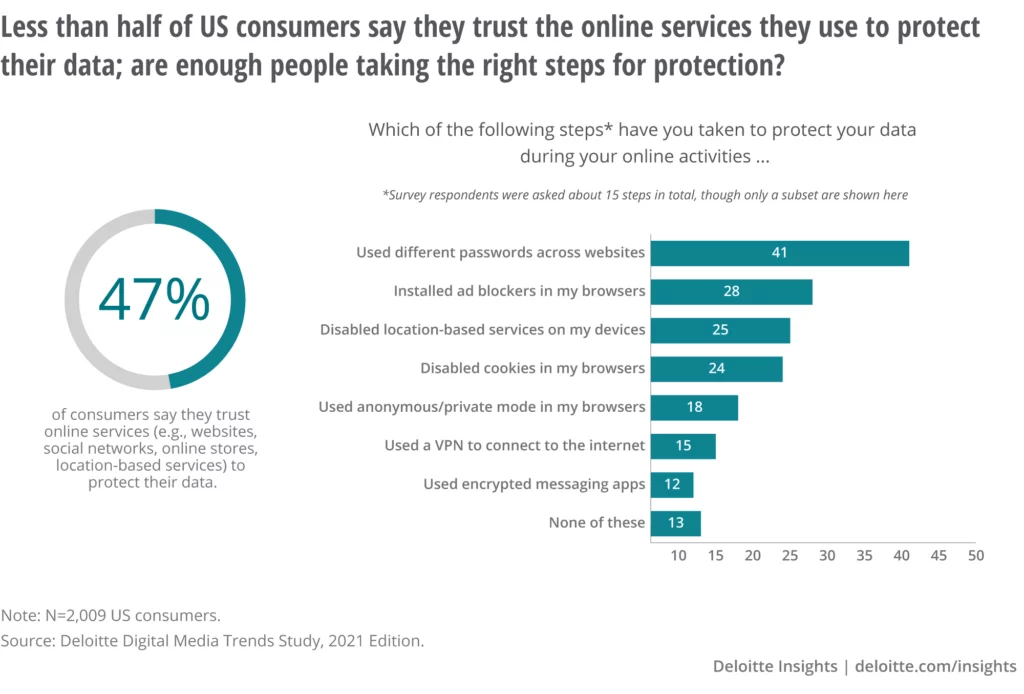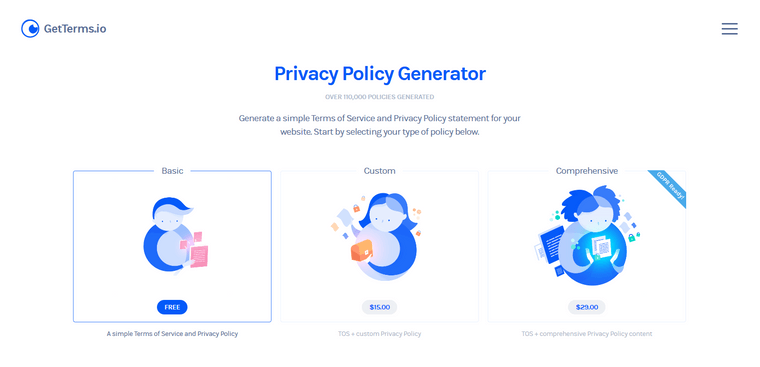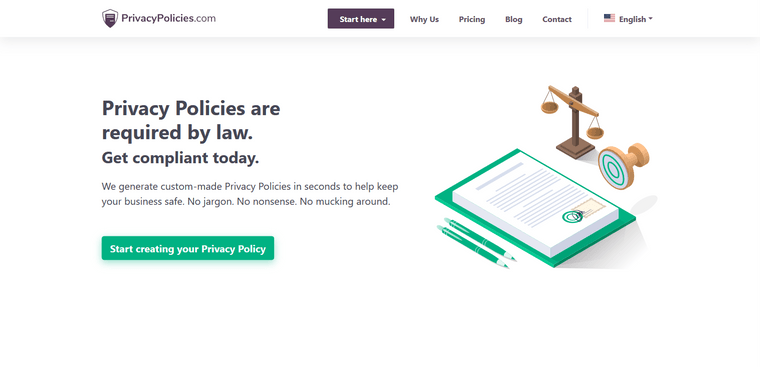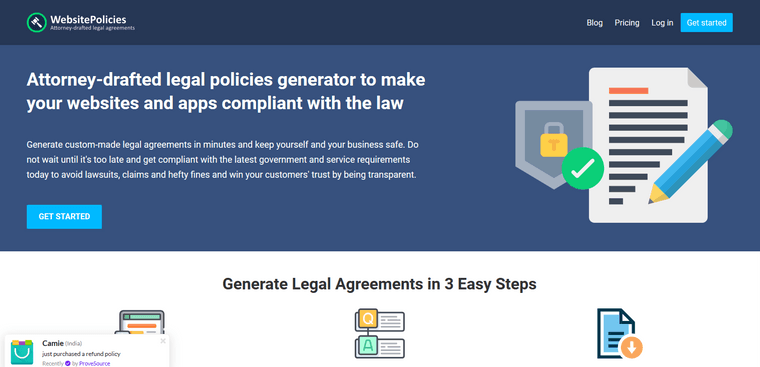In a world where every click, scroll, and keystroke contributes to an ever-expanding digital footprint, the significance of privacy policies becomes paramount. According to recent studies, an average internet user generates approximately 2.5 quintillion bytes of data daily, emphasizing the sheer volume and scope of personal information flowing through cyberspaceNavigating the language of privacy policies can be daunting, but experts in the field emphasize its significance.
“Privacy policies are not just legal documents; they are a fundamental aspect of online trust. Users need clear and concise information to make informed decisions about their data.”
What Is a Privacy Policy?

A Privacy Policy is a statement published on a website or application that explains how you collect, use, and disclose personal information (name, email, phone number, IP address, etc.), as well as your privay practices. It needs to contain the exact disclosures required by the privacy laws that apply to a business.
Contrary to popular belief, Privacy Policies weren’t created to give web agencies headaches. They actually serve an important purpose: to protect individual Internet users’ online data and personal information. By including a proper policy on website, you are making it clear to visitors that you respect their online privacy and are fully transparent about how your website uses their personal information.
Do All Websites Need a Privacy Policy?
The law doesn’t require all websites to have a Privacy Policy. Privacy laws apply to you only if you collect people’s personal information. Most modern websites intend to help website owners generate leads and sales. They track users behind the scenes for security, analytics, and marketing purposes. Essentially, privacy laws require website owners to have policy, and each law lays out exactly what your it needs to disclose.
For example, suppose a website collects personal information from customers (emails, names, phone numbers, IP addresses, etc.). In that case, it may be required to have a policy by multiple privacy laws – even if the website belongs to a small business or blog. While there are numerous examples of how a website may collect, use, or store this information, some of the most common ways are through contact forms, newsletter sign-ups, third-party payment tools, analytics tools, marketing/tracking pixels, and security tools like reCAPTCHA.
It’s also important to note that privacy laws protect individual website users, not businesses. So even if your state/area doesn’t have a privacy law, you may be required to comply with the privacy laws of other states or countries if their residents interact with these tools on your website.
Benefits of Privacy Policy on Your Website:
- Legal Compliance: Many jurisdictions and privacy laws, such as GDPR, CCPA, and others, mandate the presence of a Privacy Policy. Having one ensures your business complies with these legal requirements.
- Transparency and Trustworthiness: Displaying this policy demonstrates transparency about how you collect, use, and protect user data. This transparency fosters trust among visitors, enhancing your credibility.
- Data Protection: Clearly outlining how you handle personal information assures users that their data is treated responsibly, reducing concerns about potential misuse.
- Risk Mitigation: A well-crafted policy can act as a legal safeguard. It outlines the rights and responsibilities of both the business and the user, helping mitigate legal risks.
- Building User Awareness: The policy educates users about their rights and how their data will be used. Informed users are more likely to engage with your platform confidently.
- Vendor and Service Relationships: If your website integrates with third-party services or tools, this policy clarifies the nature of these integrations, assuring users of responsible data sharing practices.
- Marketing and Advertising Alignment: If you use user data for marketing purposes, this document informs users about this practice, promoting transparency and potentially aligning with marketing strategies.
- Legal Dispute Resolution: In case of legal disputes, this policy provides clear terms and conditions, reducing ambiguity and providing a framework for dispute resolution.
- User Consent Management: If your website requires user consent for specific data processing activities, the policy outlines how and when this consent is obtained.
- Global Reach: If your website caters to a global audience, a policy helps address varying international privacy laws, showcasing your commitment to global data protection standards.
- Regulatory Adaptability: These policies can be updated to reflect changes in laws or your business practices, ensuring ongoing compliance with evolving regulations.
- Business Reputation: Prioritizing user privacy and compliance with privacy laws contributes to a positive business image, potentially attracting users who prioritize data protection.
- SEO Benefits: Some search engines consider the presence of a policy as a positive factor when determining search rankings, contributing to better visibility.
Learn about GDPR compliance here.
Elements of Privacy Policy:
Here are compelling points clarifying the dynamics of responsibility:
- Legal Accountability:
- Client Responsibility: Legally, the website owner, or client, is accountable for the site’s policies. This responsibility extends to compliance with privacy laws and regulations relevant to their specific jurisdiction.
- Agency Advisory: While the client bears the legal responsibility, web agencies should actively advise and educate clients about the necessity of comprehensive website policies.
- Client Assumptions:
- Common Misconceptions: Clients often assume that web developers automatically include essential pages, such as Privacy Policies, as part of the website development process.
- Agency Communication: Web agencies should proactively communicate with clients to dispel assumptions and clarify the need for explicit discussions about website policies.
- Educating Clients:
- Agency Guidance: Web agencies are in a prime position to educate clients about the importance of Privacy Policies and other website-related policies.
- Risk Mitigation: Providing clients with thorough information about legal requirements and the potential consequences of non-compliance helps mitigate risks and ensures a more informed decision-making process.
- Client Decision-Making:
- Empowering Clients: While stressing the importance of proper website policies, web agencies should empower clients to make decisions regarding the inclusion and maintenance of these policies.
- Informed Choices: Clients, armed with knowledge about legal obligations, can make informed choices about the inclusion, creation, and updating of website policies.
- Protecting the Agency:
- Documented Communication: Utilizing tools like a Website Policies Waiver can serve as a protective measure for web agencies. Clearly informing clients about their responsibility to create and maintain policies, and having this documented, helps safeguard the agency’s interests.
- Risk Mitigation Strategies: Establishing a clear communication protocol and using waiver tools can be crucial risk mitigation strategies, ensuring that clients are aware of their role in policy management.
How to Generate a Privacy Policy: Choosing the Right Tools
Creating a tailored Privacy Policy for your website can be achieved through two primary methods: hiring a privacy attorney or utilizing a Privacy Policy Generator. While the former ensures personalized legal advice, it may pose financial challenges for smaller businesses. In contrast, Privacy Policy Generators offer a cost-effective alternative, providing a quick and comprehensive solution for policy creation and updates.
Using this is a simple process that involves answering a series of questions about your business. The tool then utilizes this information to generate all necessary disclosures within the policy. However, not all generators are equal, and selecting the right one is crucial for an effective and legally sound one.
Key Attributes of a Good Privacy Policy Generator:
- About Us Page: A reputable Privacy Policy Generator should have an “About Us” page that introduces the team behind the tool. It is essential to verify if a privacy attorney is involved with the company, ensuring credibility and legal expertise.
- Identification of Applicable Laws: A quality generator goes beyond a one-size-fits-all approach. Before generating a policy, it should inquire about your business and determine which privacy laws apply to you. Different laws have distinct disclosure requirements, and tailoring the policy accordingly is vital.
- Customized Questionnaire: Privacy laws often involve conditional disclosures. An effective generator adapts its questionnaire based on your responses to specific questions, ensuring the inclusion of relevant and accurate information in the policy.
- Upfront Pricing Structure: Complexity should not extend to pricing. A reliable policy generator should provide clear and upfront pricing details. Transparency in pricing ensures businesses can navigate the process without unexpected financial surprises.
- Real-time Policy Updates: Privacy laws evolve, with new requirements emerging regularly. An exemplary generator automatically updates your website policies to align with these legal changes. This feature is crucial, especially in light of the numerous laws enacted in recent years.
Top 5 Privacy Policy Generators:
1. TermsFeed: Your All-in-One Legal Companion

TermsFeed stands out as a versatile freemium tool, catering to a spectrum of digital platforms including web/mobile-based apps, websites, eCommerce, SaaS, Facebook pages, and digital products. Offering a comprehensive array of legal agreements, it facilitates the creation of terms and conditions, EULA, return/refund policies, cookies policies, and disclaimers. This tool ensures legal protection for your business while allowing you to generate a policy page for individuals free of charge, with the option to add GDPR or CalOPPA compliance at an additional cost.
Features:
- Easy to use
- All-encompassing legal agreements
- No recurring costs
- Four-step policy creation
- Free agreement templates
- Live chat support
- Global compliance with GDPR and CalOPPA
Ease of Use:
TermsFeed boasts a beginner-friendly interface, guiding users through a four-step process to input general information, business details, data collection specifics, and then download the generated policy.
Price:
While the tool is free for individual policy creation, businesses can avail the service for $14, with additional costs for GPS disclosure ($9), GDPR inclusion ($24), CalOPPA compliance ($14), and more.
2. GetTerms: Streamlined Privacy Policy Creation
GetTerms offers a straightforward approach to policy creation with well-defined plans and a quick procedure. By entering essential business details, users can swiftly generate a functional privacy policy. While the free version provides a basic privacy page, the premium options cater to business sites, offering GDPR compliance (with CalOPPA excluded). GetTerms serves as a simple yet effective privacy policy creator suitable for blogs, websites, mobile apps, or eCommerce stores.
Features:
- Log data mention
- Cookies addition
- Preferred contact for data controller
- GDPR compliance
- Terms and conditions generator
Ease of Use:
GetTerms excels in simplicity, allowing users to create a basic page in just two minutes.
Price:
GetTerms offers three plans: Basic (free), Custom ($15), and Comprehensive ($29), each tailored to varying policy needs.
3. PrivacyPolicies.com: Your All-in-One Policy Solution

PrivacyPolicies.com emerges as a comprehensive tool for crafting various policies, including privacy policies, cookies policies, disclaimers, return/refund policies, terms and conditions, and EULAs. With a focus on keeping businesses secure and users’ data protected, this tool adapts to different laws globally. Its user-friendly interface guides users through a four-step process, ensuring customization based on location.
Features:
- Custom policy generator
- GDPR and CalOPPA compliance
- Free policy templates
- Website/mobile app/eCommerce/SaaS compatibility
- 5+ translation languages
- DOCX and PDF formats available
Ease of Use:
PrivacyPolicies.com provides a builder interface similar to TermsFeed, guiding users through state selection, URL input, disclosure specifics, and more.
Price:
While the free version allows for an individual policy, business entities can create one for $14, with additional charges of $9 for each collected piece of information.
4. Shopify Privacy Policy Generator: Tailored for eCommerce

Shopify’s free policy generator is specifically designed for eCommerce stores, offering a fast and user-friendly approach. By entering basic information such as name, email, business address, and URL, users receive a basic privacy policy tailored to their eCommerce needs. This tool, like other Shopify offerings, prioritizes ease of use and efficient navigation.
Features:
- Fast privacy policy creator
- Dedicated eCommerce policy
- Get privacy policy content via email
- No additional charge
- Upgraded for GDPR
Ease of Use:
Shopify’s policy generator maintains a common theme of usability, requiring minimal details for the generation of a basic document.
Price:
The Shopify policy generator is available free of charge.
5. WebsitePolicies: Tailor-Made Policies with No Compromises

WebsitePolicies distinguishes itself by avoiding generic templates, offering custom legal agreements for both websites and mobile apps. Users can choose to host the policy page on the WebsitePolicies site or on their own, with the former ensuring automatic updates and compliance with the latest requirements. This tool provides additional features like refund policies, terms and conditions, and disclaimers for comprehensive business protection.
Features:
- Custom legal agreements
- Compliance with international laws
- Free policy page hosting
- Responsive design
- Lifetime automatic updates
- Useful clauses
- Cookie consent banner
Ease of Use:
While WebsitePolicies offers useful features, the creation process, even for a basic policy page, is not as streamlined as some other generators, requiring a bit more time.
Price:
WebsitePolicies offers two plans: Basic (Free) and Premium ($19.95), each providing unique features without recurring costs.
Conclusion:
In the ever-evolving digital landscape, a well-crafted Privacy Policy stands as a linchpin, not merely a legal prerequisite but a concrete expression of a business’s dedication to preserving user privacy. As the architects shaping the digital realm, web agencies play a pivotal role in fostering awareness among clients regarding the paramount importance of these policies.
FAQs on Privacy Policy:
Why does my business need a Privacy Policy?
A Privacy Policy is a legal document that discloses how your business collects, uses, and protects personal information. It fosters transparency, builds trust, and ensures compliance with privacy laws.
Can I create a Privacy Policy for free?
Yes, several tools offer free options for generating basic such policies. However, for business entities and additional features, some tools may have associated costs.
How often should I update my Privacy Policy?
Privacy laws evolve, and your policy should reflect these changes. Regular updates, especially when there are legal amendments, ensure your policy remains current and compliant.



